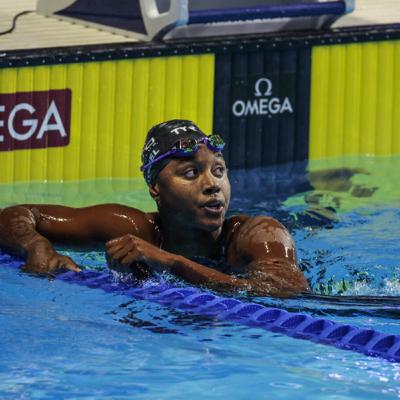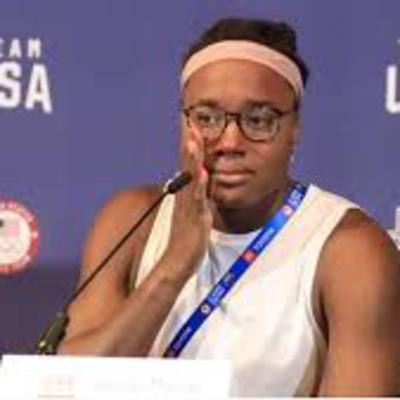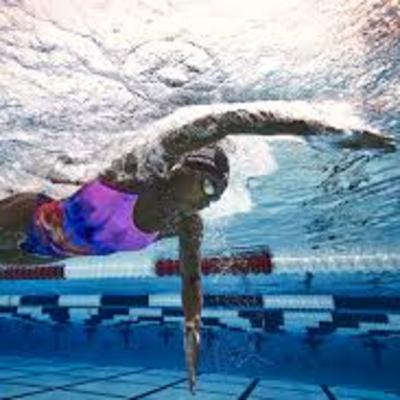Discover Crossing The Lane Lines
Crossing The Lane Lines

Crossing The Lane Lines
Author: Naji Ali
Subscribed: 4Played: 11Subscribe
Share
© Naji Ali
Description
Crossing The Lane Lines is dedicated to giving voice to the Black Swim community. We connect with coaches, swimmers, authors and activists. Seeking to inform the public about the rich aquatic history of the Black diaspora.
41 Episodes
Reverse
When many think about people in marine sciences, and in particular shark sciences, Black folk in general and Black women in particular are not the first that spring to mind, but there is a new organization that is striving to be seen and take up space in a discipline which has been largely inaccessible to minoritized communities. We'll speak to, Jasmine Graham, co-founder, president and CEO of Minorities in Shark Sciences, about their mission, programs, ecological racism, and their efforts to dispel the myth about sharks in the Black community.
Detroit was once know as the Motor City and the birthplace of MoTown, but it was also home to one of the most thriving Black swim communities in the country, where great swim legends like Robert "Bucky" Johnson, and Clyde James plied their trade. Notable swim coaches like Carl Edwards and Clarance Gatliffe paced the decks, but like so many other rich Black swimming traditions racism, access, and lack of interest began to erode this mecca of aquatic excellence. But one man is changing that for the better. We'll speak to Coach Ja'Von Waters, Sr., head coach of the Detroit All Stars, and founder and director of Aqualyfe about Detroit's swimming past and its bright future.
As the swim community slowly begins to grapple with its legacy of racism too often those who are asked to speak about its impact on Black and Brown communities are usually adults. Most are sincere in trying to make access for learn to swim and competitive swimming more equitable and inclusive for young male, female, and non-binary youth. However, no one ever seems to ask these young people how they might envision their own future. On this episode we'll speak to twin sisters Brianna and Rachel Holmes, multi-gold medal winning junior Olympic artistic swimmers, about where they see swimming now, and how they plan on making it more welcoming for all.
The Nile Swim Club, located in Yeadon, PA is the oldest Black-owned pool in the country. Today on a special episode of Crossing The Lane Lines, we'll hear an interview of Anthony Patterson, the president of The Nile Swim Club conducted by Victoria Prizzia, the curator of the POOL exhibit in Philadelphia, about the founding and mission of the Nile Swim club and it's impact on the Black community specifically, and the broader community in general.
Lia Thomas, a trans female swimmer on the University of Pennsylvania's Women's Swim team, has caused quite an uproar not only in the swimming world, but amongst the general public as well. Many claim that opposing Thomas' participation in women's sports has nothing to do with her being a trans athlete. However, over the last ten years, multiple states have banned trans athletes from participating in sports alongside they're cis-gender counterparts. But what's really going on with these bans? Is there a more broader agenda, and how does this tie in to the Black community in general, and the Black swim community in particular? We'll speak to Karleigh Webb, sports journalist and athlete about Thomas, the bans, and what's really going on in the broader context of this divide.
Pauline Jackson, Water Johnson, Willis Hanks, Charles Chapman, these are but a few of the accomplished marathon swimmers in the Black community, Though they are not as well known as their White counterparts such as Lynne Cox or Trudy Ederle, they were just as successful. Now we add one more name to this illustrious society of endurance athletes, Carl Richards. Richards, became the second person of African descent to cross the English Channel, and today he'll join us to talk about his successful swim, challenges of making it happen, and his hopes for other people of color to become marathon swimmers.
Since last summer's uprisings concerning the lynching of George Floyd, Ahamad Arbery, and Breonna Taylor, a number of swim clubs, and swim organizations have tried to foster some form of inclusivity otherwise known as diversity, equity and inclusion, but before most had the thought of making this a goal, a non-profit, grassroots organization called Diversity in Aquatics, or DIA, had been hard at work on issues of social justice, education, and water safety within BIPOC communities. Today, on the final episode of this season we'll be joined by the executive director of DIA, Dr. Miriam Lynch, to discuss the founding of DIA, it's mission, goals, and what lies ahead.
With the possible exception of Jim Ellis, and Anthony Nesty, most people in the swimming world wouldn’t be able to name one Black coach. If most Black male coaches are hardly known, what does that say about Black female coaches? Today we’ll speak to researcher, former collegiate swimmer, and elite level swim coach, Dr. Tiffany Monique Quash, about the challenges of being a Black female coach, the absence of LGBTQ+, and Queer representation in the coaching ranks, and the need for White coaches to speak up, and call out this disparity.
In 2013, a group of women who were attending the BLACK SCUBA DIVERS ASSOCIATION Annual Summit, got together to discuss the lack of representation of African American women in the Diving World, Marine Sciences, Oceanographic studies, and scientific diving. What was born from this conversation was the creation of the most comprehensive program challenging the narrative of Blacks in aquatics, and in particular Black girls and women in diving. We'll speak to Dr. Nevada Winrow the co-founder of BLACK GIRLS DIVE FOUNDATION, about the origins, mission, and success of this amazing organization.
In the US the government has wide control over public schools. They require equal educational opportunities for pupils of different races and ethnicities, the length of the school year, and of course vaccinations, but what about mandating swimming? Why isn't this vital life-skill a requirement in public schools nationwide? We'll speak to Shawn Slevin, activist, swim coach, and the founder of Swim Strong, about how her organization has put forth two bills in the New York house and senate to have learning to swim as a required part of the pubic schools curriculum.
NOTE:
To sign our Action Alert in Support of Bills S2207 and A728 mandating water safety education in our NY State schools Gk-12
For those living in NY State the Individual sign on letter is here
For businesses and organizations in OR OUT of NY State:
Organization sign on letter here
Business sign on letter here
Since last summer's uprising after the lynching of George Floyd, many White people said that they would stand with Black and Brown folk to demand systemic change that imbrues this racist society. White female athletes like Sue Bird, Megan Rapinoe, and Paige Bueckers, have come to the defense of their fellow Black and Brown teammates often times facing harsh criticism from management and the press for being vocal allies, but where are White female swimmers in all of this? Why haven't they spoken out in support of the BIPOC community in swimming? Why didn't they stand publicly with Simone Manuel after she was grilled for 24-minutes at her Olympic trials press conference? Allyship has consequences, and on today's show we'll be joined by Dr. Johanna Mellis, an historian, former D1 swimmer, and elite level swim coach about addressing the need for White female swimmers to challenge the way things are in swimming, and how they need to be.
#doubleedegeswordofwomensempowerment
#100sofUSAswimmersweresexuallyabusedfordecades
When one thinks of reasons why Black children don’t swim, people say that they can’t afford lessons, and this is true somewhat, but a more practical reason involves another critical lifeskill; food. After all, if one is dealing with food scarcity swimming probably won’t be a top priority. Further, most swim programs that target underserved communities never look at this important need. Today we’ll be joined by the founders of Tankproof, Thurman and Torrance Thomas, to discuss their mission of teaching Black kids not only how to swim, but also about food insecurity and the need to make this a vital component in decreasing the drowning rates in the Black community.
DC is home to The White House, The Washington Monument, and The MLK Memorial, everyone knows this, but what many don't know about is that its also home to some of the most vibrant Black aquatic programs in the country, and many were either founded or influenced by one man. Today, we'll speak to Lorn Hill, a 35-year employee of DC's Recreation and Parks, about the history of municipal pools, founding of an elite level swim club, Aqua Day Camp, and the Black History Invitational Swim Meet, which launched the careers of Olympians and college and aged-group swimmers around the country and around the world.
NOTE: Apologies for the brief audio distortion.
From seaweed to lost beach balls, sun-seekers bump into all sorts of surprises swimming along Florida’s iconic beaches. For Black swimmers however, there’s a complex history floating off Florida’s coastline – one of segregation and violence, but also one of protest and resistance. Diving deep into Black Florida’s fight for the right to swim, we'll speak to award winning filmmaker Cathleen Dean about the segregated beaches and pools of South Florida, and their relationship with the Civil Rights movement and the quest of water access for all.
Access to water for fun isn’t a privilege, and learning how to swim is a basic life skill. Both were denied to Black Americans through centuries of slavery and discrimination. That legacy is the focus of a daring new exhibit: POOL: A Social History of Segregation which opens Sept. 3, at the Fairmount Water Works Interpretive Center and runs through August 2022. Today we’ll speak to the curator of the exhibit, artist and avid swimmer Victoria Prizzia, about this amazing presentation on Black achievements, struggles, and hopes for the future in aquatics.
On a special episode of Crossing The Lane Lines, I'll be interviewed by the co-hosts of the podcast The End of Sport about my swim journey, the impetus for creating Crossing The Lane Lines, my ongoing frustration with USA Swimming, and a brief history of Blacks in America and the broader Black diaspora about our relationship to aquatics, and the challenges that we still face in the 21st Century.
On July 17th, at a press conference after she failed to make the 100m finals at the Olympic Trials, Simone Manuel, was grilled by journalists concerning her medical diagnosis of Overtraining syndrome. Many framed their questions as if to question whether The diagnosis really exists. All elite athletes have to answer questions about their performance, it's part of their job, but when do theses questions go too far, and are less about performance, and more about race and gender. We'll speak to scholar, author, and sports enthusiast, Dr. Letisha Brown, about the media, race, Black female athletes bodies, and the need to hold sports journalists accountable.
The crawl stroke or freestyle, is one of the most technically challenging strokes to master. Both the United States, and Australia claim to have improved it over the last 100 years, but who founded it, and why is it so important to discuss its origins concerning the subject of "Whiteness"? In part two of our two part series on the subject, we'll speak to Dr. Matt Hodler, a former D1 swimmer, history professor, and swim scholar, about the origins of the stroke, and the need to honor it's indigenous and African forebears.
Simone Manuel, is regarded as one of the best freestylers in the World. However, far too often she is referred to as the best Black swimmer in the World. Her Blackness is constantly put front and center, while at the same time you never hear someone define Katie Ledecky by her Whiteness. Why is that? In part one of a two-part series, we'll speak to former collegiate volleyballer, volleyball coach, and social justice educator, Jen Fry, about the reason why swimmers like Simone are defined by their race, why White athletes aren't, and what can be done about it.
Many Black swimmers have had to deal with being the only one at their meets that look like them. They've experienced isolation, ridicule, and racism. A foreigner in a foreign land, but on the Memorial Day weekend they get the opportunity to experience swimming from a Black perspective at the National Black Heritage Championship Swim Meet. Today we'll speak to one of the lead organizers, Lisa Webb, about the triumphs, challenges, and the afro-centric beauty of this extraordinary swimming event.
























